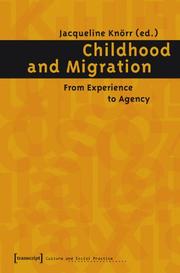| Listing 1 - 1 of 1 |
Sort by
|

ISBN: 3839403847 3899423844 9783839403846 9783899423846 Year: 2005 Publisher: Bielefeld transcript Verlag
Abstract | Keywords | Export | Availability | Bookmark
 Loading...
Loading...Choose an application
- Reference Manager
- EndNote
- RefWorks (Direct export to RefWorks)
This volume puts an emphasis on the question how children themselves experience and manage migration and by means of which they construct an identity for themselves which takes into account their experiences from both their places of origin and their host societies. What role does the cultural background of the society of origin on the one hand and the strategies of integration found in the host society on the other play in the creation of identity and of a concept of home, origin and belonging? How do children express processes of cultural orientation and integration (music, media, fashion, style) and what role do peer groups and social milieus play in this regard? How do migrant children experience xenophobia and a lack of acceptance on the side of the host society and how do they counter-balance such experiences? The approach taken is both comparative and interdisciplinary, the contributors having different theoretical and methodological backgrounds, the contributions dealing with different social and cultural settings both with regard to place of origin and host society. Besprochen in: Int. Migration & Integration, 23.10.2007, Anna Kirova Zeitschrift für Ethnologie, 131 (2006), Ulrike Bieker
Cultural studies --- Childhood. --- Ethnology. --- Identity. --- Integration. --- Youth. --- Migration; Childhood; Integration; Identity; Youth; Ethnology --- Immigrant children. --- Emigration and immigration --- Social history. --- Psychological aspects. --- Descriptive sociology --- Social conditions --- Social history --- History --- Sociology --- Assimilation (Sociology) --- Social psychology --- Child immigrants --- Children --- Immigrants --- Migration --- Childhood --- Integration --- Identity --- Youth --- Ethnology --- Einwanderung. --- Enfants immigrants. --- Identitätsentwicklung. --- Internationaler Vergleich. --- Kind. --- Soziale Integration. --- Émigration et immigration --- Aspect psychologique.
| Listing 1 - 1 of 1 |
Sort by
|

 Search
Search Feedback
Feedback About UniCat
About UniCat  Help
Help News
News